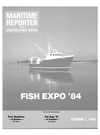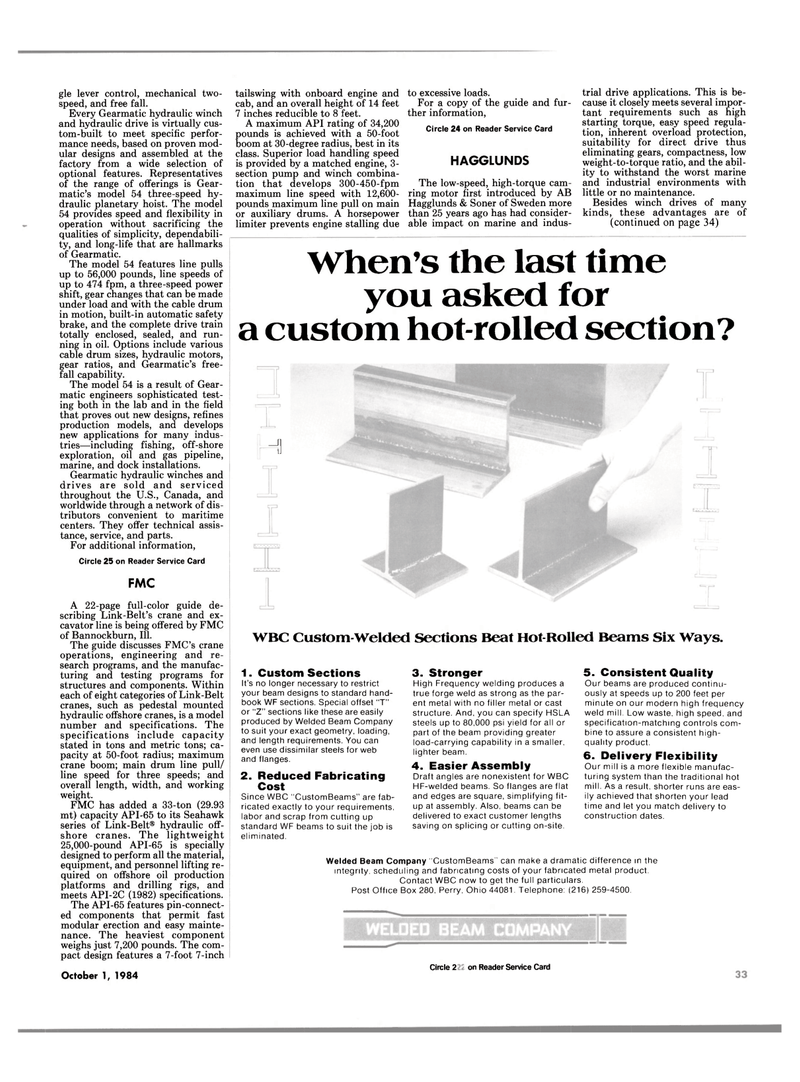
Page 35: of Maritime Reporter Magazine (October 1984)
Read this page in Pdf, Flash or Html5 edition of October 1984 Maritime Reporter Magazine
gle lever control, mechanical two- speed, and free fall.
Every Gearmatic hydraulic winch and hydraulic drive is virtually cus- tom-built to meet specific perfor- mance needs, based on proven mod- ular designs and assembled at the factory from a wide selection of optional features. Representatives of the range of offerings is Gear- matic's model 54 three-speed hy- draulic planetary hoist. The model 54 provides speed and flexibility in operation without sacrificing the qualities of simplicity, dependabili- ty, and long-life that are hallmarks of Gearmatic.
The model 54 features line pulls up to 56,000 pounds, line speeds of up to 474 fpm, a three-speed power shift, gear changes that can be made under load and with the cable drum in motion, built-in automatic safety brake, and the complete drive train totally enclosed, sealed, and run- ning in oil. Options include various cable drum sizes, hydraulic motors, gear ratios, and Gearmatic's free- fall capability.
The model 54 is a result of Gear- matic engineers sophisticated test- ing both in the lab and in the field that proves out new designs, refines production models, and develops new applications for many indus- tries—including fishing, off-shore exploration, oil and gas pipeline, marine, and dock installations.
Gearmatic hydraulic winches and drives are sold and serviced throughout the U.S., Canada, and worldwide through a network of dis- tributors convenient to maritime centers. They offer technical assis- tance, service, and parts.
For additional information,
Circle 25 on Reader Service Card
FMC
A 22-page full-color guide de- scribing Link-Belt's crane and ex- cavator line is being offered by FMC of Bannockburn, 111.
The guide discusses FMC's crane operations, engineering and re- search programs, and the manufac- turing and testing programs for structures and components. Within each of eight categories of Link-Belt cranes, such as pedestal mounted hydraulic offshore cranes, is a model number and specifications. The specifications include capacity stated in tons and metric tons; ca- pacity at 50-foot radius; maximum crane boom; main drum line pull/ line speed for three speeds; and overall length, width, and working weight.
FMC has added a 33-ton (29.93 mt) capacity API-65 to its Seahawk series of Link-Belt® hydraulic off- shore cranes. The lightweight 25,000-pound API-65 is specially designed to perform all the material, equipment, and personnel lifting re- quired on offshore oil production platforms and drilling rigs, and meets API-2C (1982) specifications.
The API-65 features pin-connect- ed components that permit fast modular erection and easy mainte- nance. The heaviest component weighs just 7,200 pounds. The com- pact design features a 7-foot 7-inch
October 1, 1984 tailswing with onboard engine and cab, and an overall height of 14 feet 7 inches reducible to 8 feet.
A maximum API rating of 34,200 pounds is achieved with a 50-foot boom at 30-degree radius, best in its class. Superior load handling speed is provided by a matched engine, 3- section pump and winch combina- tion that develops 300-450-fpm maximum line speed with 12,600- pounds maximum line pull on main or auxiliary drums. A horsepower limiter prevents engine stalling due to excessive loads.
For a copy of the guide and fur- ther information,
Circle 24 on Reader Service Card
HAGGLUNDS
The low-speed, high-torque cam- ring motor first introduced by AB
Hagglunds & Soner of Sweden more than 25 years ago has had consider- able impact on marine and indus- trial drive applications. This is be- cause it closely meets several impor- tant requirements such as high starting torque, easy speed regula- tion, inherent overload protection, suitability for direct drive thus eliminating gears, compactness, low weight-to-torque ratio, and the abil- ity to withstand the worst marine and industrial environments with little or no maintenance.
Besides winch drives of many kinds, these advantages are of (continued on page 34)
When's the last time you asked for a custom hot-rolled section?
HI
WBC Custom-Welded Sections Beat Hot-Rolled Beams Six Ways. 1. Custom Sections
It's no longer necessary to restrict your beam designs to standard hand- book WF sections. Special offset "T" or "Z" sections like these are easily produced by Welded Beam Company to suit your exact geometry, loading, and length requirements. You can even use dissimilar steels for web and flanges. 2. Reduced Fabricating
Cost
Since WBC "CustomBeams" are fab- ricated exactly to your requirements, labor and scrap from cutting up standard WF beams to suit the job is eliminated. 3. Stronger
High Frequency welding produces a true forge weld as strong as the par- ent metal with no filler metal or cast structure. And. you can specify HSLA steels up to 80,000 psi yield for all or part of the beam providing greater load-carrying capability in a smaller, lighter beam. 4. Easier Assembly
Draft angles are nonexistent for WBC
HF-welded beams. So flanges are flat and edges are square, simplifying fit- up at assembly. Also, beams can be delivered to exact customer lengths saving on splicing or cutting on-site. 5. Consistent Quality
Our beams are produced continu- ously at speeds up to 200 feet per minute on our modern high frequency weld mill. Low waste, high speed, and specification-matching controls com- bine to assure a consistent high- quality product. 6. Delivery Flexibility
Our mill is a more flexible manufac- turing system than the traditional hot mill. As a result, shorter runs are eas- ily achieved that shorten your lead time and let you match delivery to construction dates.
Welded Beam Company "CustomBeams" can make a dramatic difference in the integrity, scheduling and fabricating costs of your fabricated metal product.
Contact WBC now to get the full particulars.
Post Office Box 280, Perry, Ohio 44081. Telephone: (216) 259-4500.
Circle 217 on Reader Service Card 61

 34
34

 36
36
